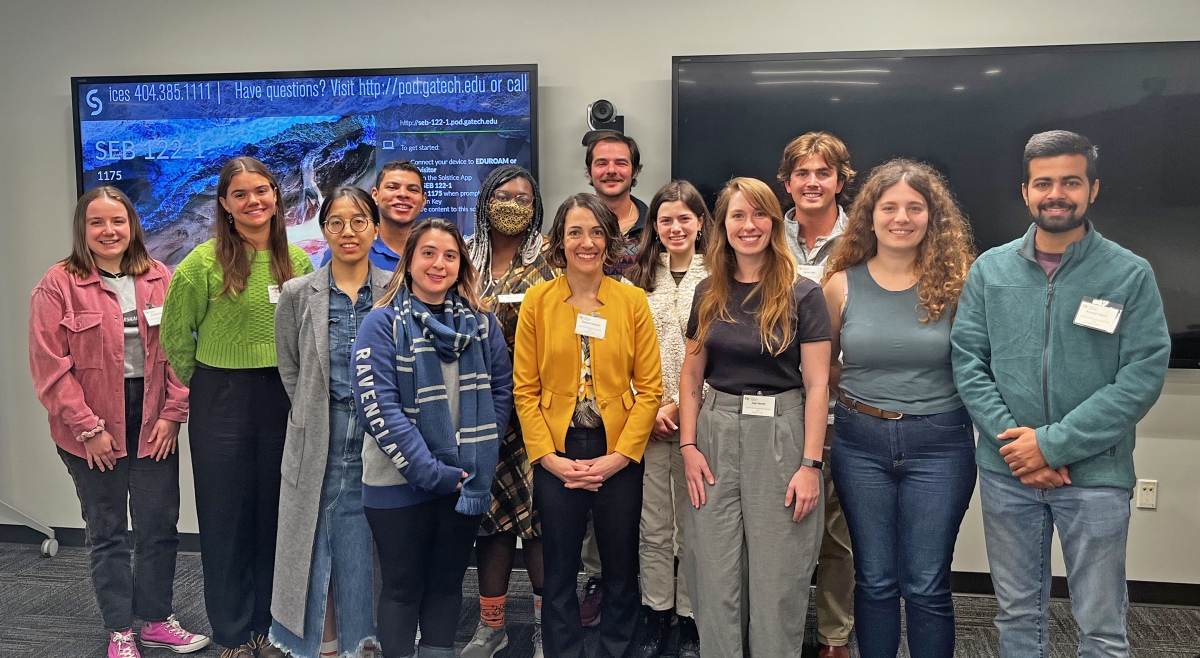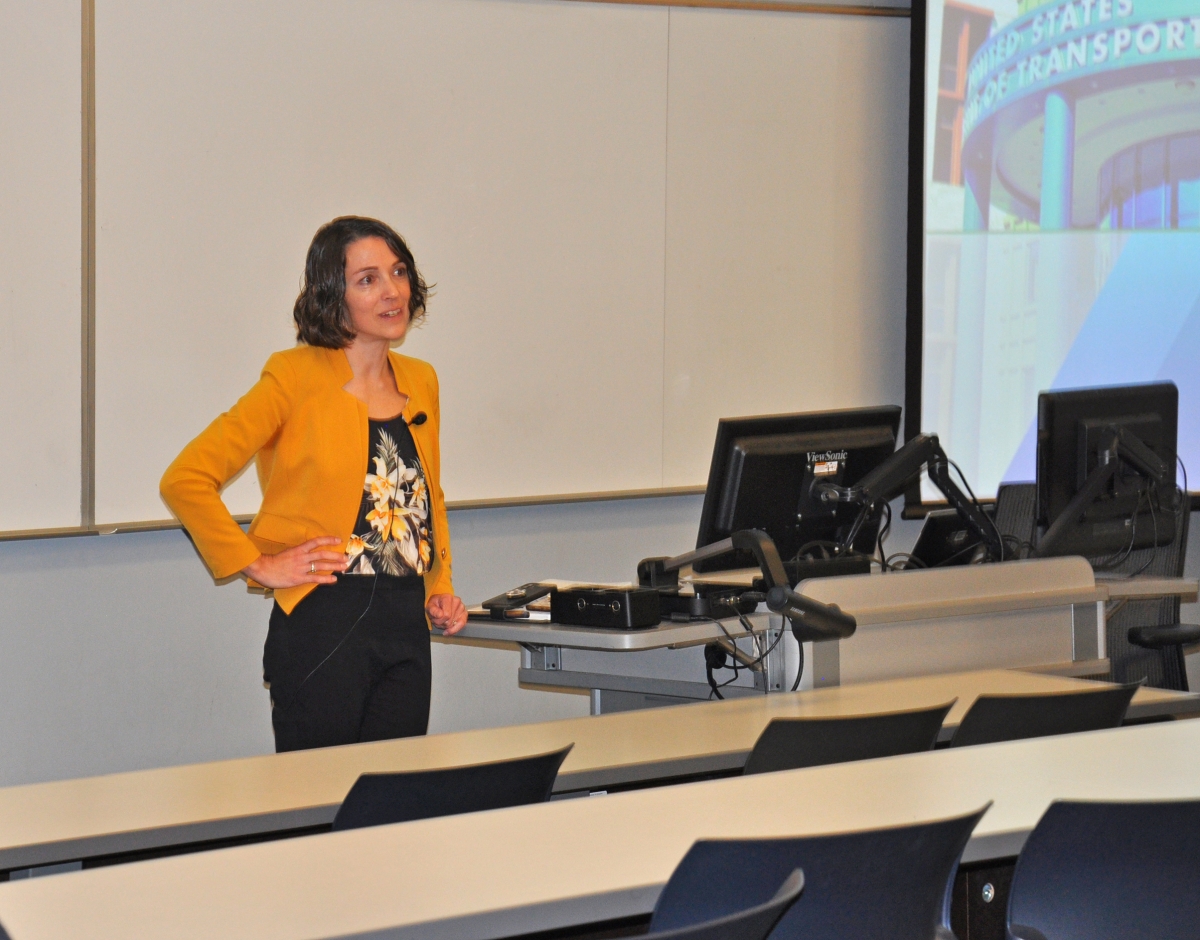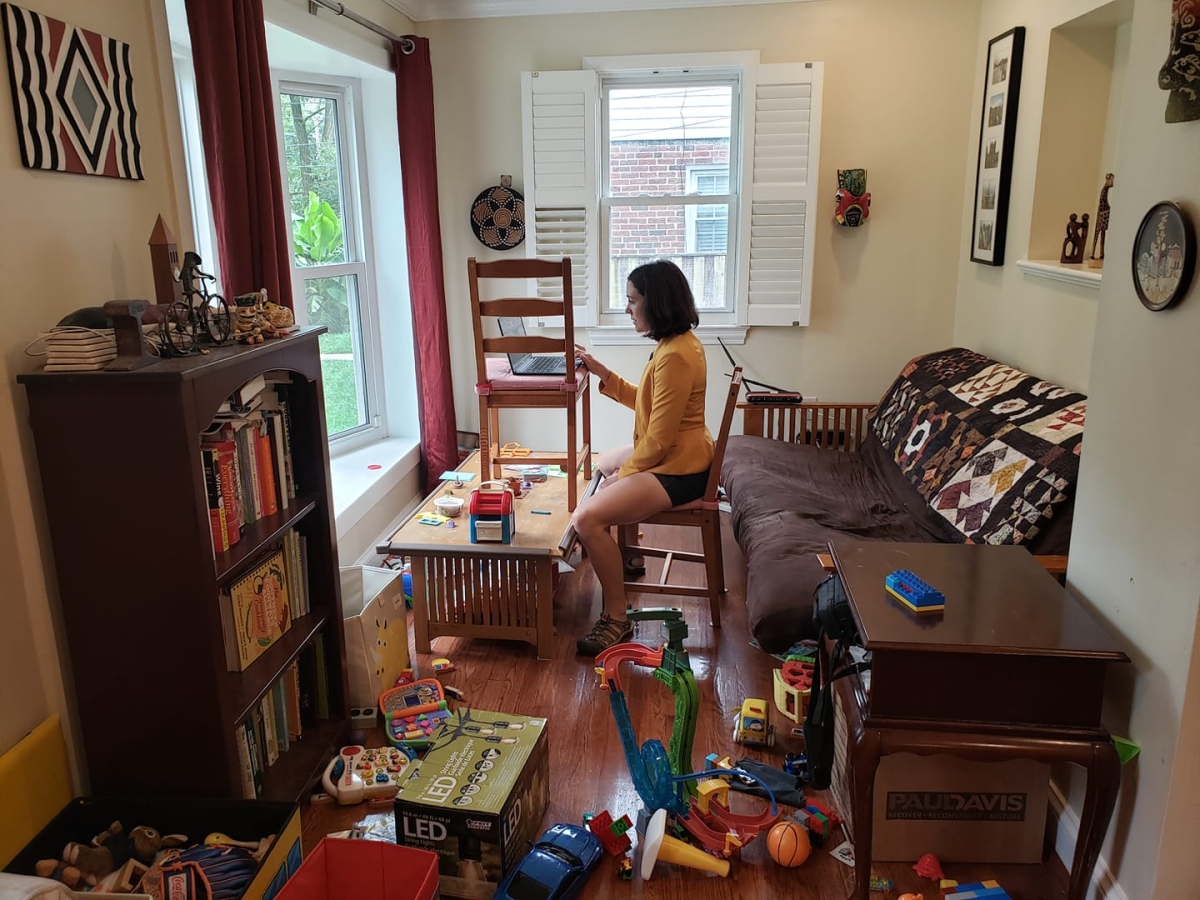
Dr. Gretchen Goldman, center, with graduate students after lunch.
Gretchen Goldman, MS EnvE 08, PhD EnvE 11, has spent the last 13 years since she graduated trying to “leave places better than we found them,” one of three central tenets of the student reflection speech she delivered at commencement in August 2011.
Goldman spoke to students, faculty and guests for the Fall 2024 Hyatt Lecture on Oct. 17.
She is the Climate Change Research and Technology Director at the U.S. Department of Transportation and co-director of the DOT Climate Change Center. From 2021 to 2023, she served in the Biden administration as the Assistant Director for Environmental Science, Engineering, Policy, and Justice.
“My time at Georgia Tech was very special to me and I think it shaped who I am in lots of ways,” said Goldman. “By the time I graduated, I had a pretty clear idea of what I wanted to do, how I wanted to affect change in different ways, but I didn’t know exactly how I would get there,” she said.

She framed her talk as “what I would have wanted to tell myself when I was leaving Tech and choosing what to do next in the world,” or “Gretchen's guide to solving big problems, serving communities, and leaving places better than you found them.” Goldman organized her talk into five lessons.
Lesson 1: Imagine and Work Towards a Better World, Even if You Can’t See the Pathway
During her time at Tech, Goldman was very involved in bike advocacy and trying to build a community around biking on campus. Her group persuaded Facilities to build a cage at the bottom of the CRC parking deck for students to work on bikes. The goal was to get more access to bikes for students, teach them how to work on bikes, and also improve campus infrastructure. By the end of her time at Tech, a couple of bike racks had been installed and sharrows painted on the street. Goldman contrasted the group’s small successes with the extensive bike infrastructure currently all over campus. “It’s so much more than I could have ever imagined when I was a student,” she said. “I thought this was a great example of just how much progress you can make if you start down a path, even if it's not clear how you're going to get there, long term.”
Similarly, when Goldman was working for the Union of Concerned Scientists, she played a significant role in crafting the Air Quality Public Health Act of 2020. “You probably haven’t heard of it, because it didn’t get passed,” she told the students. The bill was specifically proposed to address environmental injustices and who is exposed to air pollution. Since the bill didn’t get passed, Goldman chalked the experience up to figuring out what the policy pathway could be as they didn't know how it would ever get passed. During her time in the Biden White House, however, the Inflation Reduction Act was passed, the largest climate investment in history, according to Goldman, and the Air Quality Public Health Act was included in the bill. “Because we took the time to develop out that policy idea, it was ready to go when the Inflation Reduction Act was moving and now the U.S. Environmental Protection Agency is working on those elements to improve air quality in environmental justice communities and that has been a really important victory,” Goldman concluded.
Lesson 2: Don't Underestimate Your Knowledge or Skills
“When you're in an academically rigorous place like Georgia Tech you're just very hyper aware of all the things you don't know because you're being tested on it,” Goldman told the students. She encouraged the students to remember the things they did know and the skills they have that aren’t recognized in an academic setting. She shared that she felt like she wasn’t a good speaker at conferences because “the way that I write and talked was more casual and sort of layman,” but when she moved to Washington D.C. to work, “it became this incredible asset to be able to talk like a human to people on technical topics in a way that they could understand.”
Goldman gave an example where she posted on Twitter explaining that the E.P.A. disbanding a key scientific panel on air pollution was “really bad” and what the impact of the decision would be. The post wound up appearing in a New York Times article.

Goldman’s picture of the reality behind her CNN Zoom interview that went viral on social media.
On another occasion, she was interviewed on CNN during the pandemic and quickly cobbled together a professional look for the camera even though she was working from home and appearing by way of her laptop camera. When she tweeted a picture of the actual room, the tweet was viewed over 25 million times, and she began fielding interview requests to talk about the plight of parents during the pandemic. “It was really an opportunity to educate people about the real challenges that did exist for parents and caregivers,” she said.
Lesson 3: Take the Time to Understand the Real-World Context of Your Work
According to Goldman, one thing that helped her in her career path after Tech was to “think about the concepts I learned in the classroom and how they were dealt with in the real world outside of the classroom.” While she was a student, she attended a court case in downtown Atlanta, a legal battle over a permit for a coal-fired power plant they were building in South Georgia.
“I listened to them talk about my science, the thing I was working on at Georgia Tech in my research group, but they were talking about it entirely differently than the way that we would have talked about it in the lab group,” she said. It made her realize that the way technical information is used outside of academic environments can be really different. There is a critical need for someone to be able to translate technical information in a way that ensures decisions are science-based, she summed up. That realization set her on a science policy career path. “Right now, you have a tremendous amount of access to really smart people that can help you understand how all of technical work feeds into the world,” she told the students.
Lesson 4: To Solve Big Problems We Need to Change Systems
Goldman related the advice of her fellow Georgia Tech student, Liam Rattray, with whom she started the group Students Organizing for Sustainability, “We have done a lot of things, but you know, we've really only added new things. We haven't really changed the status quo.” In order to actually change the system and how things work and make sure it's a sustainable long-term change, you really need to change how things operate, she told the students. She recounted how the Biden/Harris administration made a commitment to science integrity by issuing a memorandum of support in its first week. Goldman and a team of people across several federal agencies worked together to “figure out what this would look like within government” and in 2023 released a framework for how agencies could implement scientific integrity policies. “Now there are 19 federal agencies that have new final scientific integrity policies,” she said. “It really can help provide a bigger safeguard than ever has been available before at the federal level to make sure that science and scientists can do their work without fear of politicization.”
Goldman also pointed out that Georgia Tech’s Kendeda Building is a similar example of change that is “really pushing what's possible to do in a building on campus.”
Lesson 5: Do the Hard Work of Listening, Learning, and Experiencing Discomfort on Hard Topics
Goldman talked about two executive orders issued by the Biden Harris White House. The first, the Justice 40 Initiative, called for at least 40% of all the climate and clean energy investments to go to disadvantaged communities. It was very gratifying to her to continue the environmental justice work she began outside of government on the inside and work on the side of science within the White House at the federal level.
The second initiative was building out government-wide guidance on indigenous knowledge, which she spearheaded. This culminated in a White House Tribal Nation Summit where the guidance was released. “This is the first time that there's ever been a White House recognition of indigenous knowledge as a concept, and this has been really a bigger step,” she said.
She encouraged the students to take advantage of their time at Tech to “seize the moment to be here and learn and expose yourself to all kinds of perspectives and learnings and ask questions.”
“I hope that one day you have an opportunity to do everything you can to leave a place better than you found it,” she concluded.
